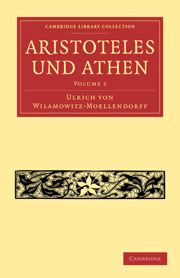Book contents
- Frontmatter
- Contents
- ZWEITES BUCH. Untersuchungen auf grund der aristotelischen Politie
- DRITTES BUCH. Beilagen
- 1 Die phratrie der Demotioniden
- 2 Der erste krieg mit Aegina
- 3 Die chronologie der pentekontaetie
- 4 Solons gedichte
- 5 Die attische skoliensammlung
- 6 Pindaros siebentes pythisches gedicht
- 7 Der process der Eumeniden
- 8 Die zeit der Thesmophoriazusen
- 9 Die rede für Polystratos
- 10 Die paragraphe und Lysias wider Pankleon
- 11 Lysias wider die kornhändler
- 12 Isokrates Panegyrikos 100–114
- 13 Die briefe des Isokrates
- 14 Demosthenes prooemium 55
- 15 Die gedichte des Aristoteles
- Sachregister
15 - Die gedichte des Aristoteles
Published online by Cambridge University Press: 10 November 2010
- Frontmatter
- Contents
- ZWEITES BUCH. Untersuchungen auf grund der aristotelischen Politie
- DRITTES BUCH. Beilagen
- 1 Die phratrie der Demotioniden
- 2 Der erste krieg mit Aegina
- 3 Die chronologie der pentekontaetie
- 4 Solons gedichte
- 5 Die attische skoliensammlung
- 6 Pindaros siebentes pythisches gedicht
- 7 Der process der Eumeniden
- 8 Die zeit der Thesmophoriazusen
- 9 Die rede für Polystratos
- 10 Die paragraphe und Lysias wider Pankleon
- 11 Lysias wider die kornhändler
- 12 Isokrates Panegyrikos 100–114
- 13 Die briefe des Isokrates
- 14 Demosthenes prooemium 55
- 15 Die gedichte des Aristoteles
- Sachregister
Summary
Die entrüstung über die verräterei Memnons von Rhodos, der sein freund Hermias zum opfer fiel, hat dem Aristoteles zwei gedichte entlockt, die wir der biographie des Hermippos verdanken. denn dass auf diesen die darstellung des Athenaeus zurückgeht, über irgend eine musikalische schrift, die z. b. den Polemon citirte, wird klar durch das citat 696 f., und anders wird man auch den bericht des Diogenes (V 6) nicht beurteilen), so viele mittelglieder auch zwischen dem originale und dem letzten ausschreiber liegen. für die kritik ist also massgebend, dass alles worin Athenaeus und Diogenes stimmen ohne weiteres Hermippos ist. was wir gegen beide gewährsmänner ändern, ändern wir gegen einen zeugen des dritten jahrhunderts. vor Hermippos hatten die gedichte berücksichtigung gefunden in der von diesem selbst bezweifelten verteidigungsrede des Aristoteles (Ath. 697), bei dem falschen Aristippos (Diog. V 4) und vielleicht dem Pythagoreer Lykon von Iasos (Aristokles bei Euseb. pr. ev. XV 792), denen man wol so viel glauben kann, dass der schurke, der den Aristoteles wegen religionsfrevels belangte, nicht sowol die gedichte als die tatsache ihrer existenz misbraucht hatte. sie sind denn auch dem pedantismus nicht zum opfer gefallen, der dem Platon seine zum teil eben so gut bezeugten epigramme abstreitet.
Das epigramm auf Hermias stand unter einer statue desselben in Delphi; eine prosaische inschrift muss die namen des geweihten und des weihenden getragen haben. andere weihungen von statuen verordnet das testament des Aristoteles.
- Type
- Chapter
- Information
- Aristoteles und Athen , pp. 403 - 416Publisher: Cambridge University PressPrint publication year: 2010First published in: 1893



